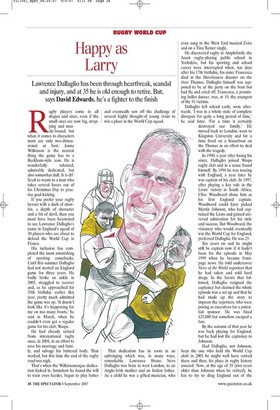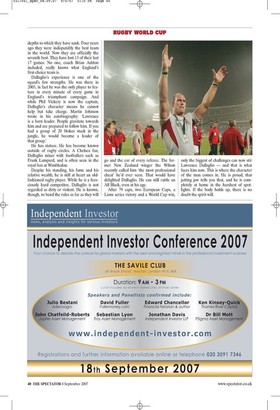Happy as Larry
Lawrence Dallaglio has been through heartbreak, scandal and injury, and at 35 he is old enough to retire. But, says David Edwards, he's a fighter to the finish Rugby players come in all shapes and sizes, even if the small ones are now big, strapping and muscle-bound, but when it comes to characters most are only two-dimensional at best. Jonny Wilkinson is the nearest thing the game has to a Beckham-style icon. He is wonderfully talented, admirably dedicated, but also somewhat dull. It is difficult to warm to a man who takes several hours out of his Christmas Day to practise goal-kicking.
If you prefer your rugby heroes with a dash of showbiz, a depth of character and a bit of devil, then you must have been heartened to see Lawrence Dallaglio's name in England's squad of 30 players who are about to defend the World Cup in France.
His inclusion has completed the most astonishing of sporting comebacks. Until this summer Dallaglio had not started an England game for three years. He badly broke an ankle in 2005, struggled to recover and, as he approached his 35th birthday earlier this year, pretty much admitted the game was up. 'It doesn't look like it's happening for me on too many fronts,' he said in March, when he couldn't even get a regular game for his club, Wasps.
He had already retired from international rugby once, in 2004, in an effort to save his marriage and family, and salvage his battered body. That worked, but this time the end of the rugby road was nigh.
That's when the Wilkinsonesque dedication kicked in. Somehow he found the will to train even harder, began to play better and eventually saw off the challenge of several highly thought-of young rivals to win a place in the World Cup squad.
That dedication has its roots in an upbringing which was, in many ways, remarkable. Lawrence Bruno Nero Dallaglio was born in west London, to an Anglo-Irish mother and an Italian father. As a child he was a gifted musician, who even sang in the West End musical Evita and on a Tina Turner single.
He discovered rugby at Ampleforth, the Jesuit rugby-playing public school in Yorkshire, but his sporting and school career were interrupted when, ten days after his 17th birthday, his sister Francesca died in the Marchioness disaster on the river Thames. Dallaglio himself was supposed to be at the party on the boat but had flu and cried off. Francesca, a promising ballet dancer, was, at 19, the youngest of the 51 victims.
Dallaglio left school early, soon afterwards. 'I was in a whole state of complete disrepair for quite a long period of time,' he said later. 'For a time it certainly destroyed our family.' He moved back to London, went to Kingston University and for a time lived on a houseboat on the Thames in an effort to deal with the tragedy.
In 1990, a year after losing his sister, Dallaglio joined Wasps rugby club and in a sense found himself. By 1994 he was touring with England, a year later he was captain of his club. In 1997, after playing a key role in the Lions' victory in South Africa, Clive Woodward chose him as his first England captain. Woodward could have picked Martin Johnson, who had captained the Lions and gained universal admiration for his style and success. But Woodward, the visionary who would eventually win the World Cup for England, preferred Dallaglio. He was 25.
Ten years on and he might still be captain now if it hadn't been for the episode in May 1999 when he became frontpage news. He told undercover News of the World reporters that he had taken and sold hard drugs. In the furore that followed, Dallaglio resigned the captaincy but claimed the whole episode was a set-up and that he had made up the story to impress the reporters, who were posing as executives for a potential sponsor. He was fined £25,000 but somehow escaped a ban.
By the autumn of that year he was back playing for England, but he had lost the captaincy to Johnson.
Had Dallaglio, not Johnson, been the one who held the World Cup aloft in 2003 he might well have retired there and then, his place in rugby history assured. Now, at the age of 35 (two years older than Johnson when he retired), he has to try to drag England out of the depths to which they have sunk. Four years ago they were indisputably the best team in the world. Now they are officially the seventh best. They have lost 13 of their last 17 games. No one, coach Brian Ashton included, really knows what England's first-choice team is.
Dallaglio's experience is one of the squad's few strengths. He was there in 2003, in fact he was the only player to feature in every minute of every game in England's triumphant campaign. And while Phil Vickery is now the captain, Dallaglio's character means he cannot help but take charge. Martin Johnson wrote in his autobiography: 'Lawrence is a born leader. People gravitate towards him and are prepared to follow him If you had a group of 20 blokes stuck in the jungle, he would become a leader of that group.'
He has stature. He has become known outside of rugby circles. A Chelsea fan, Dallaglio mixes with footballers such as Frank Lampard, and is often seen in the royal box at Wimbledon.
Despite his standing, his fame and his relative wealth, he is still at heart an oldfashioned rugby player. While he is a ferociously hard competitor, Dallaglio is not regarded as dirty or violent. He is known, though, to bend the rules as far as they will go and the ear of every referee. The former New Zealand winger Stu Wilson recently called him `the most professional cheat' he'd ever seen. That would have delighted Dallaglio. He can still rattle an All Black, even at his age.
After 79 caps, two European Cups, a Lions series victory and a World Cup win, only the biggest of challenges can now stir Lawrence Dallaglio — and that is what faces him now. This is where the character of the man comes in. He is proud, that jutting jaw tells you that, and he is completely at home in the harshest of spotlights. If the body holds up, there is no doubt the spirit will.




































































 Previous page
Previous page